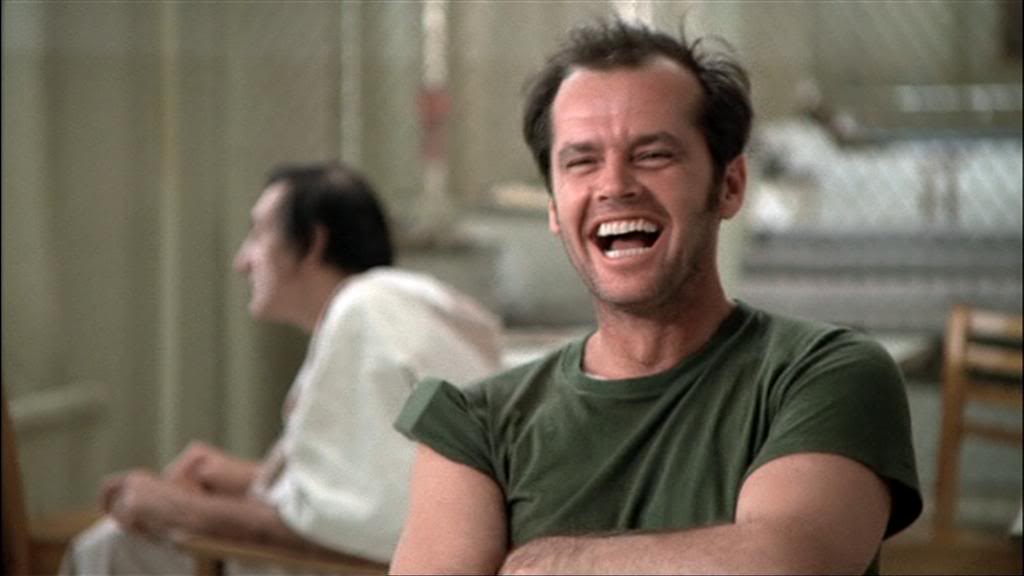Power and Authority:
One Flew Over:
America has long made heroes of figures who assert their individuality, yet many American novelists have written about characters whose individualism conflicts with the societies around them. The character of Mcmurphy is also incongorous with the institution that he has been put into, as he represents the life and colour of the outside world, and the institution however is bereft of colour and joy. therefore Mcmurphy is presented as non-conformist and unwilling to accept authority. his non-conformity is evident in the first therapy scene where he is wearing colour whilst the other characters and the building is all white and dull.

McMurphy is destruction to the status quo. he doesn't respect authorial figures e.g. when he addressed the doctor his language is informal. another example is his relationships with nurse Ratchet, as he is always the one questioning her power and decisions e.g. his demand to watch the world series. also when he enters the nurses office without permission. Nurse Ratchets unwillingness to allow patients to watch the world series shows the abuse of her power.
The film is notable for having men existing in a passive relationship with at leat one authoritative and controlling woman. she comes across as dominant when she is challenged. she is presented as the antagonist who thwarts McMurphy's goals and hope.
Forman previous film banned in his own country for shining a negative light on communism. this can be presented when Nurse Ratchet ignores the democratic vote of the patients, which can be linked to communism. power and authority is gained by the fear of nurse Ratchet.
Schatz argues that characters are now the main focal point in films whereas in classical Hollywood characters merely influenced the story line.
Vertigo:
In Vertigo power and authority are represented in a variety different ways in their text. One of the ways Vertigo does this is through the main character Scottie, Scottie is shown as a male authoritative figure throughout the film with his dominant expression and approach to women. One scene where this is very clear is when Scottie jumps into the river to save Madeline and the scene that follows, Scottie is shown as an Authoritative figure here because he takes action immediately jumping in to save the women. During the 1950's women were seen as lower in power than men with men being the most powerful in society. Going to the scene after this Scottie took Madeline back to his house and she is left powerless laying in the bed whilst Scottie makes her some tea. A common theme shown by most Hitchcock films is having a Blonde girl in it, this was usually done because Alfred Hitchcock liked blonde women and saw them as a tool in his films, someone who doesn't have any power except through sexual persuasions. However this is shown to be different in Vertigo where we find out Madeline had aided in the murder of Gavin's wife, when we find this out we get a completely different outlook on women power within the film and how women act as a hidden power often unseen by the audience.
Furthermore Scottie's misplaced in society, this is most present in his attempt to regain his authority after he lost is when Madeline died. his attempt at regaining control is presented as desperate and sad when he forces Judy to Dye her hair so she looks identical to Madeline because of the illusion created by the idea of helping madeline helps Scottie see himself as an authoritative figure which the time of the film was seen as being manly. Scottie tries to grasp onto his authority to try to fell secure in himself. This can be linked to the context of the film as 1950's America was a time of fear in which men were desperately trying to hold onto their power partially due to the rise of the 2nd wave of the feminist movement and the wars America fought; men are trying to recapture an outdated sense of authority.
Furthermore Scottie's misplaced in society, this is most present in his attempt to regain his authority after he lost is when Madeline died. his attempt at regaining control is presented as desperate and sad when he forces Judy to Dye her hair so she looks identical to Madeline because of the illusion created by the idea of helping madeline helps Scottie see himself as an authoritative figure which the time of the film was seen as being manly. Scottie tries to grasp onto his authority to try to fell secure in himself. This can be linked to the context of the film as 1950's America was a time of fear in which men were desperately trying to hold onto their power partially due to the rise of the 2nd wave of the feminist movement and the wars America fought; men are trying to recapture an outdated sense of authority.
The film can be read as a study of men trying to re-assert their control over women in post war America.

These notes are generally good Caitlin. You show a good understanding for the films and their shared themes. However, please can you add important visuals/videos to this post. Remember, you will need to use this blog as a revision resource in the future and the easier you make it for yourself the better.
ReplyDeleteAll the best
Mr Cooper